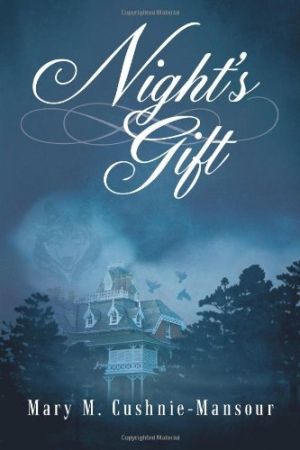Night's Gift
Mary Cushnie-Mansour’s protagonist in Night’s Gift is Virginia Manser, a woman newly moved from Toronto to the smaller city of Brantford. She is hoping that the change of scenery will help her forget a recent heartbreak.
On a warm October evening, Virginia lets herself be lured to “the Mystery House,” her name for a stately manse she walks past each workday. Curiosity leads Virginia to sneak up to the front entrance. Through a window, she sees two figures—a man and woman—illuminated by flickering candlelight, engaged in a quarrel. The man’s “grotesque fangs” are revealed as Virginia watches the argument in fascination. She quickly realizes her vulnerability and turns to run, but doesn’t get far. When Virginia awakens inside the house, she is in a bedroom being watched over by a beautiful, dark-haired woman. Virginia is certain her life is in danger; she has stumbled into a nest of vampires. Despite numerous attempts to escape, she is held prisoner by Count Basarab Musat and his household.
It takes courage to publish a vampire novel at a time when they are ubiquitous. Add a tortured-romance element, a contemporized Gothic-fiction style, and a heroine who is both conflicted and decisive, and, surprisingly, the book begins to hold its own. Cushnie-Mansour manages to keep these three elements in even tension throughout the narrative. Readers will be pulled along by Virginia’s plight and how, as a modern woman, she chooses to face it.
That said, Night’s Gift comes very close to overemphasizing certain Gothic elements. The frequent exclamation points, the heroine’s conflict between her head and heart, the Basarab Musat’s blatant masculinity, and the revelation of his true purpose for keeping Virginia captive nearly cause the story to overflow with purple prose. The Gothic novel has its own set of rules, which, when pushed too far, can drown the characters in melodrama.
In addition, the pacing of the first quarter of the novel is too slow due to the amount of background information required to set the stage. Cushnie-Mansour takes the basic elements of the typical vampire tale and embellishes them to create her own world. While her set-up work is necessary, it also bogs down the narrative with details.
And yet, the backstory of Count Musat and his family history, how they maintain their secret in a world of cell phones and computers, the relationships between the family members, and Virginia’s own hidden agenda somehow meld into a novel that firmly stamps its unique approach to the vampire genre on its pages. The tension winds tighter as Virginia’s true situation is unveiled. Night’s Gift, at its end, transforms from a shaky horse-drawn carriage to a bullet train, in all the best ways.
Readers who are diehard Gothic fiction fans, as well as those who enjoy urban and/or dark fantasy, will be impressed by Cushnie-Mansour’s distinctive tale. Night’s Gift is a surprisingly intriguing addition to vampire lore.
Reviewed by
J. G. Stinson
Disclosure: This article is not an endorsement, but a review. The publisher of this book provided free copies of the book and paid a small fee to have their book reviewed by a professional reviewer. Foreword Reviews and Clarion Reviews make no guarantee that the publisher will receive a positive review. Foreword Magazine, Inc. is disclosing this in accordance with the Federal Trade Commission’s 16 CFR, Part 255.

